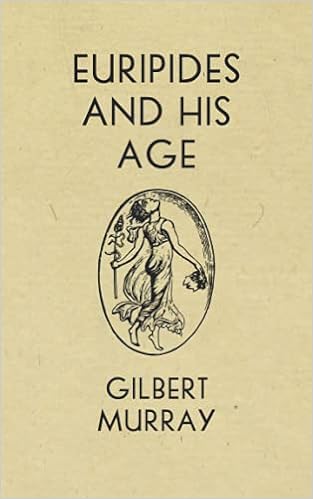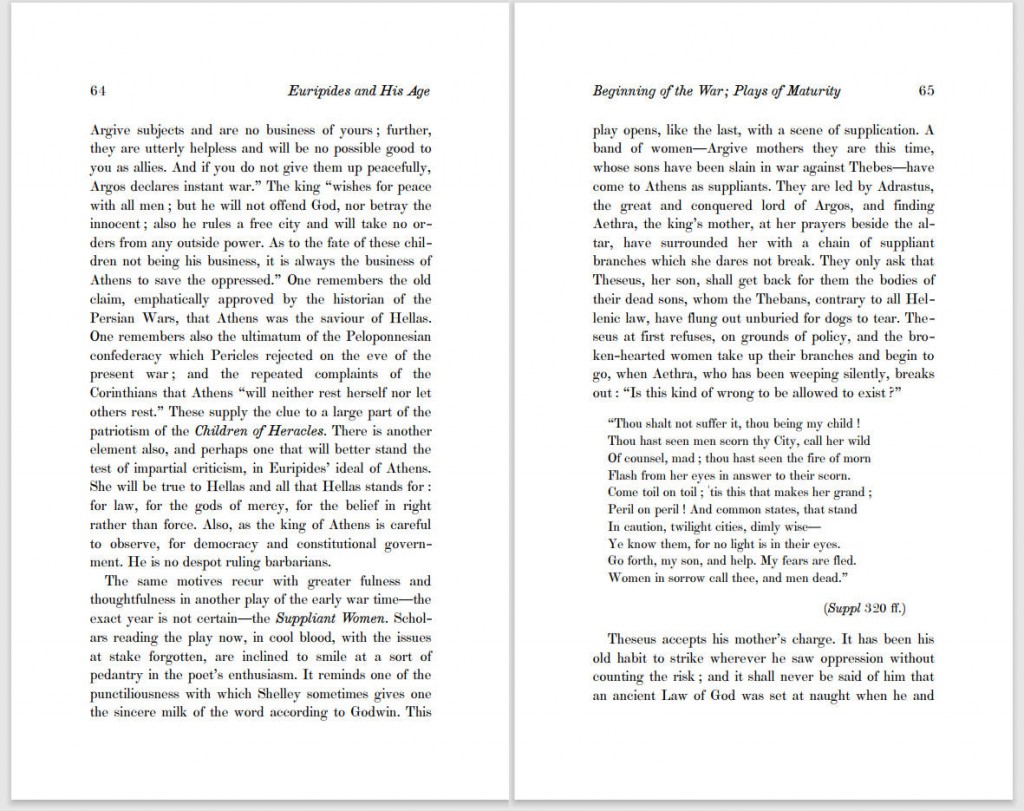The new Serif Classics edition of Euripides and His Age brings us a study of a Greek playwright by a famous classicist of a hundred years ago. And if that does not sound exciting to you, it is because it hardly sounds exciting to anyone.
That is why this book comes as such a delightful surprise.
Once again, Dr. Boli has contributed a short introduction, which by permission of the publisher he reproduces here.
—
There is a certain class of books that seem to be about one very small thing, but are really about everything. The Compleat Angler is about fishing, but it has been read with delight for centuries by people who have never dipped a hook into a stream. The Anatomy of Melancholy is about the humors and their effect on the disposition, but no one would care about an outdated medical treatise if it did not also happen to touch on everything that makes us human.
Here, likewise, is a book about an ancient Greek playwright; and yet if you have never read Euripides, or never liked him when you did read him, you will still probably enjoy this book. You may end up loving this book. You may want to pass it on to your friends and your enemies as the one book that explains everything.
Gilbert Murray had one of those great minds that can effortlessly find the universal in the particular; and this book, which is certainly a study of Euripides, is also a book about everything it means to be human. It is especially about what it means to be aiming for the stars when the great mass of humanity is desperately clinging to the earth—to be on the side of light in an age of darkness. We need only quote a few stray thoughts from it to make the point clear:
Every man who possesses real vitality can be seen as the resultant of two forces. He is first the child of a particular age, society, convention; of what we may call in one word a tradition. He is secondly, in one degree or another, a rebel against that tradition. And the best traditions make the best rebels. (Chapter 1.)
In every contest that goes on between Intelligence and Stupidity, between Enlightenment and Obscurantism, the powers of the dark have this immense advantage: they never understand their opponents, and consequently represent them as always wrong, always wicked, whereas the intelligent party generally makes an effort to understand the stupid and to sympathize with anything that is good or fine in their attitude. (Chapter 2.)
A man everlastingly wrapped round in good books and safe living cries out for something harsh and real—for blood and swear-words and crude jagged sentences. A man who escapes with eagerness from a life of war and dirt and brutality and hardship to dwell just a short time among the Muses, naturally likes the Muses to be their very selves and not remind him of the mud he has just washed off. (Chapter 4.)
We must distinguish carefully between the two notions, Enlightenment and Democracy. They happen to have gone together in two or three of the greatest periods of human progress and we are apt to regard them as somehow necessarily allied. But they are not. (Chapter 5.)
Irony is the mood of one who has some strong emotion within but will not quite trust himself on the flood of it. And romance is largely the mood of one turning away from realities that disgust him. (Chapter 5.)
After all they were a democracy; and, as Thucydides fully recognizes, a great mass of men, if it does commit infamies, likes first to be drugged and stimulated with lies: it seldom, like the wicked man in Aristotle’s Ethics, “calmly sins.” (Chapter 5.)
The Bacchae is the most formal Greek play known to us; its Chorus is its very soul and its lyric songs are as long as they are magnificent. For the curious thing is that in this extreme of formality and faithfulness to archaic tradition Euripides has found both his greatest originality and his most perfect freedom.
We are apt at the present moment of taste to associate together two things that have no real connexion with one another—sincerity of thought and sloppiness of form. (Chapter 8.)
In Gilbert Murray’s analysis, you are likely to find Euripides’ age startlingly similar to our own. It was obviously startlingly similar to Murray’s own age in many ways, and that is probably the secret of Athens and the hold it has over our thoughts. It is startlingly similar to every subsequent age, because at least the germs of all the thoughts that have been thought are there. All our modern virtues and all our modern vices are visible in the Athens of the classic period. Great thinkers dared to think great thoughts, in a profusion and a variety perhaps never again equaled. Of course, the common Athenians killed or exiled those great thinkers with distressing regularity, but that did not prevent the thoughts from being thought, or the thinkers from outliving their persecutors by two and a half millennia.
This is what makes Euripides and His Age a book about everything. You will see your own time in it, and you will feel some strong hints about how the enlightened citizen reacts to times like these—whatever times these are.
But perhaps the best thing that can be said about this book is that it will make you crave Euripides. It will make you scour your library for that half-forgotten translation of his plays that you know is lurking around here somewhere, or will make you scour the Internet for the best translation available. The number of academic critics who can accomplish that feat is very small, but Gilbert Murray is among them.
—
If you think now that you might like to read the book, you can certainly find the text on line. But for those who like to hold paper in their hands while they read, the Serif edition is neatly typeset and just the right size for taking with you everywhere.
Note that, for some reason, Amazon’s “Look Inside” feature is showing a different and much inferior edition of the book. [UPDATE: This is no longer true.] You may be sure that the Serif edition is designed to a higher standard, as you can see from the sample below.

